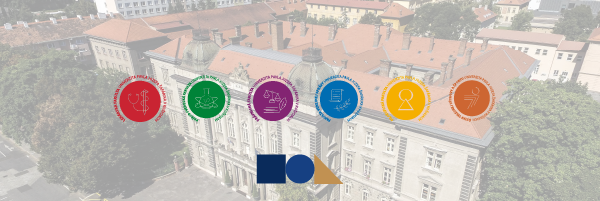Personalized medicine
Although today’s diagnostic is based on modern trends in genomics, proteomics, metabolomics, bioinformatics, molecular and cell biology methods, many oncology patients are still dying due to late, incorrect or inaccurate diagnostics. According to america‘s nationwide survey of 400 prestigious oncology specialists, the rate of incorrect and inaccurate diagnostics is 28%, with some types of cancer even more than 50% (e.g. breast cancer, lymphatic vessels cancer, sarcomas). The main causes are the absence of biomarker, incorrect cancer characteristics, incorrect pathology of the tissue due to limiting diagnostic technologies, inadequate genetic and genomic information available at the time of diagnosis. However, the biggest problem of today’s cancer diagnostics is that the specific biomarker can not be accurately quantified and thus the therapy is not set up correctly and eventually becomes inaccurate and unsuccessful.
- Personalized diagnostics
The first objective of the personalized medicine program is therefore to develop early, accurate, specific, quantifiable, multiplexed, readily available and inexpensive diagnostic tests that would help to effectively and successfully treat and prevent cancer. The principle will be the quantification (visualization and sequencing) of all 3 basic biomarkers (DNA, RNA and protein) as well as their simultaneous visualization. CTM will be based on the development of new and modern diagnostic biotechnology methods by linking nucleic acid chemistry, biochemistry, genomics, proteomics, bioinformatics, molecular biology, pathology and medicine with using high resolution microscopy and 3D visualization of biopsies of single cell or microscopic genome in the cell nucleus, and also by new sequencing technologies, and other methods including qPCR, DNA microarray, FACS, Elisa. - Personalized therapy
The second objective of the personalized medicine program is to develop modern oncology treatments based on outputs from pharmacogenetics and pharmacogenomics, development of gene and viral therapies (including the development of new generations of iRNA drugs and CRISPR / Cas9 of modern gene therapy), new radiation therapies, discovery of new drugs including phenotyp screening, application of new drugs (including nanotechnologies).
Regenerative medicine
Tissue and organ regeneration and stem and somatic cell research in terms of their therapeutic potential has been one of the most researched, developed and it seems also the most attractive medical topics in the last decade, with a prospect of widespread use in practical medicine. Regenerative medicine and cell therapy present “hot” topics in current biomedical research. The principles of regenerative medicine are generally based on the use of autologous or allogenic somatic or stem cells, or therefrom derived molecules, genetic manipulation of cells and advanced tissue and organ replacements. Research in this area is strongly interdisciplinary. Several methods of cell therapy have been enhanced by the implementation of bio-engineering principles throughout the concept, revealing a number of new possibilities for cell interactions with organs, tissues, cells and materials produced by bioadditive techniques, 3D printing. The tissue substitutions prepared in this way can be used in a personified manner for tissue regeneration and perspectively the formation of new organs.
- Pancreatic islet transplant program
The aim of this activity is in cooperation with the SAS Polymer Institute in Bratislava and CellTrans Inc. in Chicago to initiate and maintain the program of transplantation of pancreatic islands in Slovakia. This involves Slovakia into the group of few countries of the world that utilize transplantation of pancreatic islands as part of the complex care of a diabetic patient focused primarily on diabetics with poor metabolic control of DM and frequent occurrences of hypoglycaemia or defective hypoglycaemia perception. In addition to the basic purpose of introduction of DM1 therapy by transplantation of pancreatic islands another goal will be joining the research focusing on transplanting encapsulated pancreatic islets without the need to administer immunosuppressants.
Neuroscience
In the area of neuroscience, we focus primarily on a group of neurodegenerative diseases that, with the aging of the population, become an increasingly serious medical and financial problem in society. Nowadays the diagnosis of these diseases is possible at relatively late symptomatic stages of the disease, which, due to the progression of degenerative changes in the brain, significantly limits the use of effective neuroprotective or disease modifying therapy. The main objective is the identification of multimodal specific prodromal biomarkers of neurodegenerative diseases, particularly Parkinson’s disease, which enable the treatment of these diseases to be switched from symptomatic to presymptomatic stages of the disease. In cooperation with advanced genetic possibilities- “next generation sequencing,” we are focusing on identifying new genetic diseases as well as a detailed description of phenotypic genotype correlations that will lead to a better understanding and, therefore, more accurate diagnosis and treatment of genetically-related neurological diseases. In this area, CTM specialists work across the spectrum of basic research, as well as clinical and social disciplines.
Clinical studies
CTM aims to become a top-level and internationally recognized center for the development of oncodiagnostic technologies and therapies and verify the safety and effectiveness of given diagnostic tests and therapies by using clinical studies. Part of the preparation for clinical studies is accreditation according to the international standard STN EN ISO 15189: 2013 Medical laboratories. We will also make effort to obtain the full set of internationally recognized ethic and scientific quality requirements that needs to be followed when designing and conducting clinical studies, conducting clinical studies documentation and processing clinical studies reports.
Biobank
Biobank is an essential prerequisite for valid biomedical research in the near future. It is focused on the collection of biological material and especially biomedical research data. Biobank will be focused on collecting samples from a healthy population and a population with socially significant types of disease. The aim is to enter into international pharmaceutical research and biomedical-oriented research to ensure the high sensitivity of diagnostic methods and the high efficiency of treatment methods. Biobank will be a main point for future research, particularly in the field of oncology, metabolic and cardiovascular diseases. Biobank will be a part of the BBMRI-ERIC international consortium.




